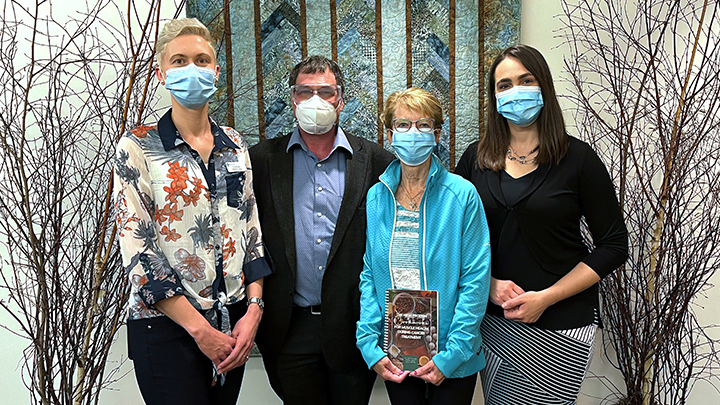
June 28, 2022

Dietitian Lindsay Lee, left, oncologist Dr. Michael Sawyer, patient Pat Spruyt and Dr. Carla Prado tout the benefits of more protein in the diet to preserve muscle mass during cancer treatment. A new publication, The High Protein Cookbook for Muscle Health During Cancer Treatment, offers tasty meal ideas to achieve this goal.
Story & photo by Karolina Sekulic
EDMONTON — Muscle-wasting is the primary nutrition problem patients experience during cancer treatment, says Dr. Michael Sawyer, an oncologist at the Cross Cancer Institute.
“Besides the active cancer we’re trying to treat, our patients can have many changes going on that affect their nutrition health such as hormone changes, changes in how many calories they need, changes in appetite or how much food they eat or drink, changes in physical activity and inflammation.”
To help address this issue, a new cookbook — The High Protein Cookbook for Muscle Health During Cancer Treatment — has been published by Dr. Carla Prado, a dietitian and University of Alberta researcher who studies the role of muscle in health.
“Low amounts of muscle can predict poor physical function, lower quality of life, surgical complications, and reduced survival,” she says. “People with cancer need more protein than healthy individuals. One of my research goals is to support dietitians in their practice. Putting together this cookbook can be one tool that dietitians can provide to patients.”
Lindsay Lee, a dietitian at the Cross Cancer Institute, works with patients and their families to help them translate what’s known from nutrition science into practical everyday food choices.
“This can improve patients’ nutrition which, in turn, better supports them on their cancer journey and helps them to stay stronger through treatment,” she says.
Pat Spruyt is undergoing targeted therapy at the Cross Cancer Institute and vouches for the importance of protein in her diet and health.
“I feel like I have more energy and I’m not as tired when I have more protein,” she says. “I knew protein was important and I thought I was eating enough. Lindsay helped me to understand how much protein was in different foods and she gave me a target amount to work at.
“One way I learned to increase my protein was with my snacks. I like that this cookbook also offers snack options. I’ve only tried one recipe so far, but in looking through them, they seem easy to make and the ingredients are simple. I’ve made a list of the next ones I’m going to try.”
Some of the way to add protein, says Lee, include: “Adding a yogurt to a typical snack of fruit, including a glass of milk instead of water with a meal, and cooking a larger portion of meat and using leftovers in soups or salads boost protein and make a difference. This cookbook can provide more ideas for patients to include protein foods at all meals and snacks. For example, the Huevos Rancheros Breakfast Wraps recipe has 27 grams of protein.”
“It’s rewarding to see how better nutrition can make a positive impact in a person’s treatment and quality of life,” Lee adds.
“It provides hope because it’s something a person can have some control over to make positive changes. Nutrition doesn’t have to be hard — and we want to make it as enjoyable as possible.”
A limited number of printed copies of The High Protein Cookbook for Muscle Health During Cancer Treatment are available; 300 have been distributed to AHS dietitians to give to patients undergoing cancer treatment. Digital copies are available for download. Also see ‘More Recipes’ at ahs.ca/recipes.